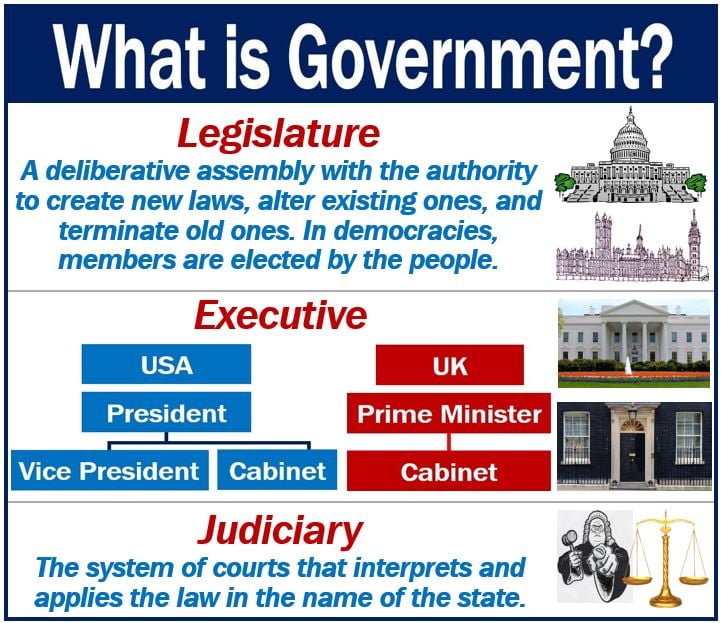The term ‘government’ may refer to the manner or process of governing a country or a specific system we use for controlling a country. Government also means the group of people who control a country and make national decisions. In other words, the term may refer to a process, the system that is in place, or a group of people.
When Americans hear the word ‘government’ they usually think of the Capitol Building in Washington D.C. Britons, on the other hand, think of the Houses of Parliament in London.
Put simply, government can mean a few different but related things. First, it refers to the group of people in charge of running a country or state, like the president, prime minister, or cabinet. It can also mean the overall system used to govern a place, like democracy or monarchy. And finally, it can describe the way power is used to manage or control a country, organization, or group of people.

Etymology of government
Etymology is the study of the origin of words and how their meanings have evolved.
In the English language, the term has existed since the late fourteenth century with the meaning ‘act of government or ruling.’ In the 1550s, it acquired the meaning ‘system by which a thing, especially a state, is governed.’
The term comes from Old French Governement, which meant ‘control, direction, administration.’ In 1702, the English word also acquired the meaning ‘governing power in a given place.’
Government – group of people governing
When it means a group of people governing a country, the term is similar to ‘a clan.’ It aims to govern the whole family or nation with powers of military, financial, and civil laws.
Its main purpose is to protect and improve the welfare of its citizens. It also seeks to fulfill citizens’ needs for the betterment of the country.
Most governments consist of a legislature, executive, and judiciary.
Legislature
The legislature is a body of people who make, change, or repeal the country’s or state’s laws.
People often, especially Americans, refer to those who work in this the legislature as ‘lawmakers.’ Britons refer to them as MPs (Members of Parliament).
In a democracy, there are elections in which the people vote for their lawmakers. We refer to those who vote as the ‘electorate.’
Executive
The executive is the government organ that exercises authority in and holds responsibility for the governance of the country.
In the US, for example, the executive is the President, Vice President, and his or her Cabinet. In the UK, Canada, or Australia, it is the Prime Minister and his or her Cabinet.
Government Ministers also make up the executive.
The Australian Parliamentary Education Office says the following regarding the roles of the executive:
“Leaders of the executive governments of Australia and the US – the Prime Minister and the President – share their responsibilities with members of their respective Cabinets.”
“Each Cabinet member is a high-ranking member of the government and is responsible for the leadership of a government department.”
Judiciary
The judiciary or judicial system is the system of courts that interprets and applies legislation. In other words, the courts, judges, magistrates, etc. who interpret and apply the law in the name of the state. A magistrate is a volunteer judge who works in a magistrate court.
We also call this part of government the ‘court system‘ or ‘judicial branch.’
The judicial branch is one of the three main parts of government in most democracies, along with the executive and legislative branches.
This branch includes the courts, judges, and the Chief Justice, and it’s in charge of making sure the laws are followed fairly. Its main job is to protect citizens’ rights and make sure justice is served.
Capital ‘G’ or lower case ‘g’?
When we are talking about the specific Government of a nation, we use a capital ‘G.’ In other words, the body that decides a specific country’s policy.
If, on the other hand, we are referring to the government in general, we use a ‘g‘ in lower case form.
Look at these two examples:
– ‘The Government has just announced that it will raise the retirement age from 65 to 70 years.’ In this case, we are specific. So, we use a capital ‘G.’
– ‘In most countries, national and local government taxes are collected separately.’ Here, we use a lower case ‘g‘ because the term has a general meaning.
Civil servants and bureaucracy
Bureaucrats or civil servants are government workers too. However, they have not been elected.
If I need a new birth certificate, for example, I will communicate with civil servants rather than lawmakers.
Civil servants or bureaucrats make up the bureaucracy.
